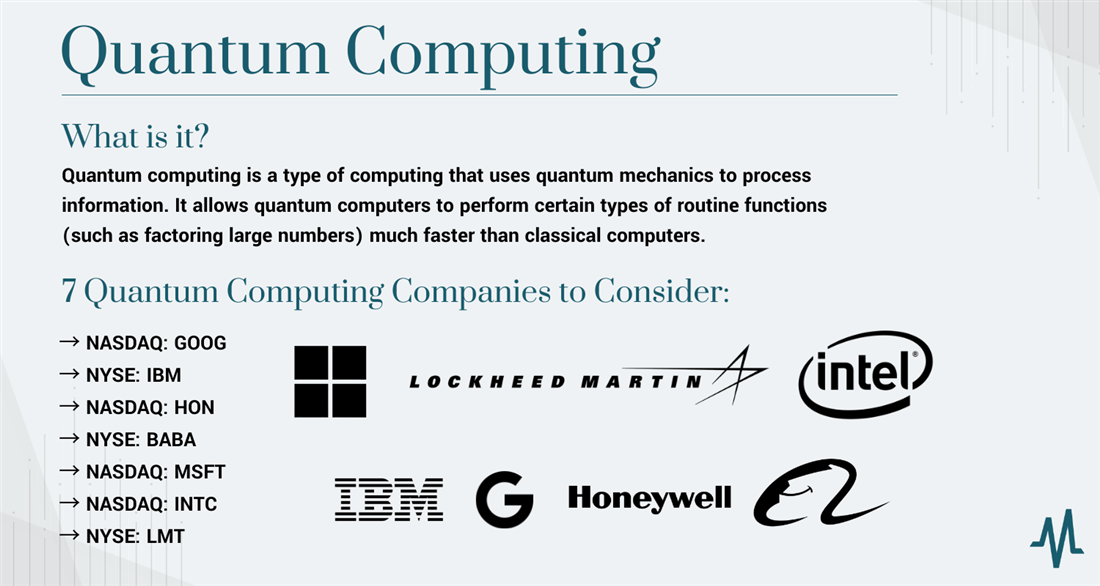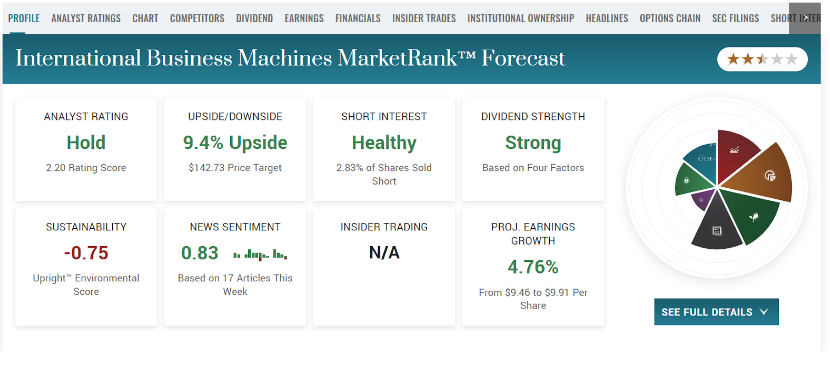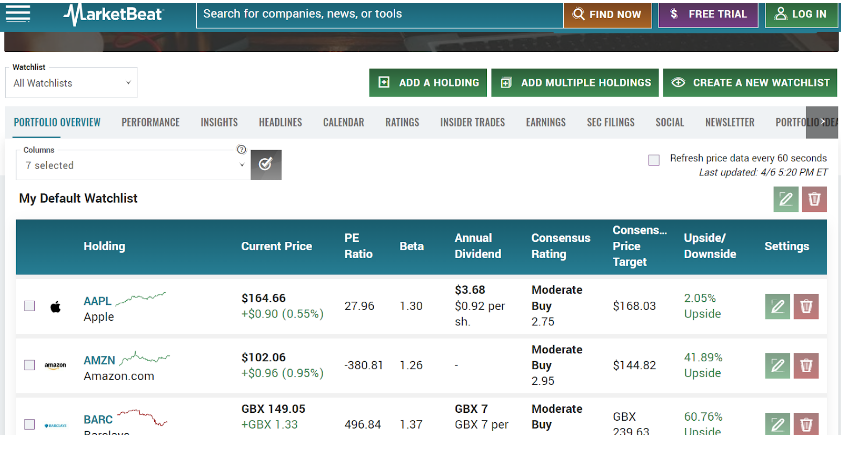Quantum computing is a relatively new type of computer programming that incorporates quantum mechanics into a machine's functionality. This may result in faster computer processing, especially when working with large data sets. A quantum computing investment can also provide access to additional tech developments, as the companies researching this functionality work on various projects simultaneously.
Are you interested in learning how to invest in quantum computing? You can invest in quantum computing by buying shares of stock in companies working at the forefront of developing quantum technology. Read on to learn more about how businesses use quantum computing and a few of the best companies to invest in.
Quantum computing: An overview
Quantum computing is a type of computing that uses quantum mechanics to process information. It allows quantum computers to perform routine functions (such as factoring large numbers) much faster than classical computers.
Classical computers use bits, binary units of information that can be either 0 or 1, to perform calculations. Quantum computers, on the other hand, use quantum bits (qubits), which can exist in a superposition of states, meaning they can be 0 and 1 at the same time. This allows quantum computers to perform some calculations much faster than classical computers.
Quantum computing works by manipulating the state of qubits through a process called quantum gates. Quantum gates are similar to the logical operations used in classical computing, such as "and," "not" and "if" statements. However, quantum gates can also create and manipulate quantum superpositions and entanglement, a unique quantum phenomenon. This allows services like cloud computing to exist without significant delays, even when many users are on the system.
The immense power of quantum computing has been compared to that of supercomputers, which are thousands of times more powerful than traditional computers. As the technology continues to advance, it could potentially be used in artificial intelligence (AI) and robotics, and even cryptography and financial analysis.
However, like any technology, quantum computing has its limits. For example, quantum computers have difficulty calculating more than a few thousand qubits. That's because quantum computing algorithms aren't yet mature enough to efficiently scale and use larger numbers of qubits. So for now, they can only be used for small-scale computational problems like cryptography or machine learning tasks. Plus, it's hard for classical computers (the kinds we use today) to read and interpret data produced by these machines; scientists are still working on finding ways around this problem. While complex calculations can be done quickly with a quantum computer if it's properly programmed, the constraints of the physical system limit their speed and effectiveness.
Quantum computing technologies
The type of quantum hardware a company uses depends on the size and complexity of its goals. Generally, these machines consist of one or several qubit arrays connected by couplings. Superconducting architectures are the most popular choice to build up these arrays and couplings. These systems use lower temperatures (close to absolute zero) to reduce decoherence when manipulating the qubits.
Trapped-ion architectures are also gaining traction. While the superconducting system provides a quicker gate clock speed and a dependable physical platform, the ion-trap setup boasts better-quality qubits and adjustable links. Another option is the use of photonic qubits, which are much faster than other types of qubits because they rely on light instead of matter. However, these systems are still in the early stages of development and are not yet widely available.
Aside from quantum hardware, quantum software is the other key factor in the success of any quantum computer. It's needed for control, integration, analysis, error correction and optimization — all of which are required to get an accurate result. The software can provide instructions on how to best use the physical system the machine is built on, making sure all calculations are done properly and quickly.
Programming languages like Qiskit (which is open source) help developers write custom code for running complex algorithms on the systems they use or develop new ones. By programming a sequence of logical operations between qubits (called gates), they can create entire programs designed specifically to harness the power of quantum computers — a process called “quantizing” code. These programs make data processing more efficient since they can operate on multiple states at once.
Learn more: Computer and technology stocks
Why invest in quantum computing?
Quantum computers have the potential to be significantly more powerful than classical computers, which means they can solve complex problems that are currently beyond the capabilities of the computers we use daily. Quantum computing investing can put investors ahead of the tech curve in defense and computer developments.
Quantum computers can be used to develop more accurate and efficient machine learning algorithms used in applications such as image and speech recognition. This can be particularly useful for companies developing A.I. technology. Explore a few top-rated tech stocks on MarketBeat to learn more about the largest players in the quantum computing sphere.

How to invest in quantum computing
Learning how to invest in quantum technology starts with learning how to research, buy and monitor shares of tech stocks. Though the specific steps you'll go through and stock ratings on MarketBeat you'll want to explore may vary depending on your needs, the basic steps are as follows.
Step 1: Explore the market.
Many companies are investigating quantum computing and incorporating them into various research and consumer products. Tech companies are of course at the forefront of the industry, funding much of the proprietary research propelling new developments. These companies are developing their quantum computing hardware, software and tools, which can be sold to consumers and businesses to streamline data processes.

Image: IBM is one of the many stocks you can invest in to gain quantum computing exposure.
Startups are also active in the quantum computing field, sometimes funded by larger venture capital firms. Aerospace and defensive stocks are also active in quantum computing research, incorporating this tech into cryptography solutions. The next section will cover a few of the largest companies researching quantum computing.
Step 2: Monitor potential investments.
Once you've identified a few stocks you may want to invest in based on quantum computing projects, monitor their performance for a few days or weeks. This will help you determine the ideal time to place your buy order to avoid overpaying for trending shares. Consider creating an account with My MarketBeat to add stocks to your watch list for simple sorting. This feature will save your picks, allowing you to review them later.

Image text: My MarketBeat allows you to save a list of stocks to review later, streamlining the research process.
Step 3: Place a buy order.
When you've determined your entry point, you can finally log onto your brokerage account to order a buy. Since you've researched price, using a limit order to set your order on autopilot makes sense. If the broker is able to complete the order, you'll see the shares directly in your account.
Step 4: Keep up with news.
Active financial management doesn't end when your order is complete. Keep up with the latest news and developments related to your stocks, and monitor dividend distributions. If you've invested in one or more of the best dividend stocks according to MarketBeat, note each dividend's classification for tax purposes.
7 quantum computing companies to consider
Investing in quantum computing starts by researching how companies use this technology to enhance their products and services. The following are some of the best quantum computing companies to invest in. You'll notice that many overlap with our list of the best technology stocks on MarketBeat, as quantum computing is just one part of a broad overall investigative infrastructure.
Alphabet Inc.
Alphabet Inc. NASDAQ: GOOG, the company behind Google, is also a major name in quantum computing development. Google has been developing quantum computing hardware since the early 2000s. In 2019, Google claimed to have achieved "quantum supremacy," meaning that its quantum computer could solve a problem that would take a classical computer more than 10,000 years.
International Business Machines
International Business Machines NYSE: IBM is a multinational technology company with more than 170 years in tech development. IBM has been involved in quantum research since the 1980s. The company has also recently announced the opening of the IBM Quantum Computation Center, which houses the world's largest fleet of quantum computing systems available for external access.
Honeywell International
Honeywell International NASDAQ: HON is a conglomerate that operates in various industries, including aerospace, building technologies and productivity solutions. In 2020, the company announced that it had developed the world's most powerful quantum computer based on trapped-ion technology. The computer, which has a quantum volume of 64, is designed for industrial and scientific applications and has since been launched commercially.
Alibaba Group Holding Limited
The Alibaba Group Holding Limited NYSE: BABA is a major player in the global technology industry, with a wide range of businesses and operations. In addition to its well-known e-commerce offerings, the company is investing heavily in file sharing and cloud tech knowledge. Its cloud computing subsidiary, Alibaba Cloud, has been developing a cloud-based quantum computing platform to provide faster download services.
Microsoft Corporation
The Microsoft Corporation NASDAQ: MSFT is one of the world's top software and hardware developers, with a total market capitalization of over $2 trillion. The company is best known for its Windows operating system and line of products. Microsoft has also developed a software platform, called the Microsoft Quantum Development Kit that allows developers to write quantum algorithms and simulate quantum systems.
Intel Corporation
Intel Corporation NASDAQ: INTC is one of the world's leading providers of microchips. Lately, it has been focusing on developing a hybrid quantum-classical computing approach, which combines the power of quantum computing with traditional classical computing methods. This approach allows for developing algorithms using quantum and classical processing power, which is particularly useful for solving complex optimization and simulation problems.
Lockheed Martin Corporation
Lockheed Martin Corporation NYSE: LMT is a major player in the global aerospace and defense industry, focusing on incorporating advanced computing into defensive equipment. The company has been working on developing a quantum computing system called the Lockheed Martin Quantum Computing Center, which uses superconducting qubits to perform quantum operations.
Quantum computing and the future
As more companies invest in quantum computing, the technology continues to evolve and become even more powerful. Quantum computers can now process complex calculations and solve problems that would be impossible for a classical computer to do. This makes them especially useful when tackling difficult optimization problems or simulating physical systems.
The potential applications are also growing. Quantum computing could revolutionize machine learning by creating new neural network architectures and powering next-generation AI. Researchers from fields like healthcare have used quantum simulations to gain molecular insights into how certain proteins work, leading us closer to finding cures for various diseases. The possibilities are limitless.
But with every innovation comes new challenges. Quantum computing is no exception. As the technology becomes more powerful, so do the security threats it faces. This is because quantum computers can break existing cryptographic protocols and algorithms. However, companies such as Alphabet and IBM are working on developing quantum-safe cryptographic solutions. Others are making quantum computing more accessible and reducing its energy consumption and carbon footprint.
Keep up with the changing tech market
Tech is one of the fastest-growing fields in the world, and quantum computing is at the forefront of the industry. This developmental nature means that the top players in the industry can change relatively often. If you're planning to invest in the quantum computing sphere, it can be a good idea to spread your risk out between multiple companies in the sector.
Investing in a tech ETF is one way to diversify your investments during the purchase process. Quantum computing ETFs like the First Trust Nasdaq Artificial Intelligence and Robotics ETF NASDAQ: ROBT and the Global X Future Analytics Tech ETF NYSE: AIG provide access to a "basket" of stocks that trades as a single unit. This allows you to divide your money between multiple major investments without researching individual stocks.
Before you consider Alibaba Group, you'll want to hear this.
MarketBeat keeps track of Wall Street's top-rated and best performing research analysts and the stocks they recommend to their clients on a daily basis. MarketBeat has identified the five stocks that top analysts are quietly whispering to their clients to buy now before the broader market catches on... and Alibaba Group wasn't on the list.
While Alibaba Group currently has a "Moderate Buy" rating among analysts, top-rated analysts believe these five stocks are better buys.
